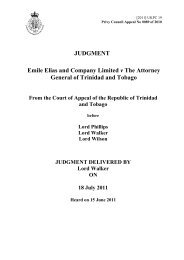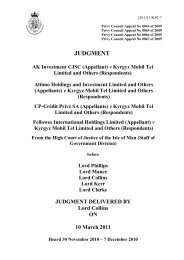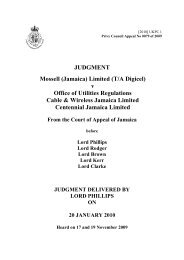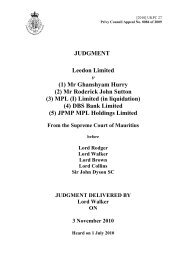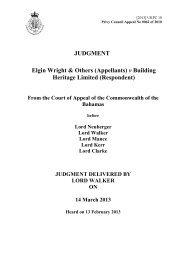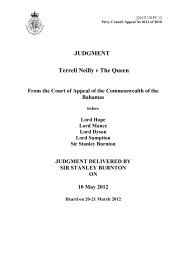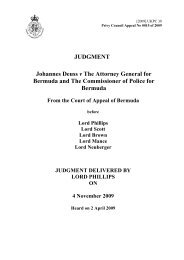Nadine Rodriguez v (1) Minister of Housing of the Government (2 ...
Nadine Rodriguez v (1) Minister of Housing of the Government (2 ...
Nadine Rodriguez v (1) Minister of Housing of the Government (2 ...
Create successful ePaper yourself
Turn your PDF publications into a flip-book with our unique Google optimized e-Paper software.
LADY HALE<br />
1. Gibraltar is a small place and affordable housing is in short supply. At issue are<br />
<strong>the</strong> policies <strong>of</strong> <strong>the</strong> <strong>Housing</strong> Allocation Committee, <strong>the</strong> statutory body which is<br />
responsible for <strong>the</strong> allocation <strong>of</strong> <strong>Government</strong> housing. Their policy is to grant joint<br />
tenancies to couples only if <strong>the</strong>y are married to one ano<strong>the</strong>r or have a child in<br />
common. This inevitably excludes same sex couples who can nei<strong>the</strong>r marry nor have<br />
children toge<strong>the</strong>r. Is such a difference in treatment unconstitutional?<br />
The history<br />
2. The appellant is <strong>the</strong> tenant <strong>of</strong> a modest <strong>Government</strong> flat. She lives <strong>the</strong>re with<br />
her same sex partner. They have been in a relationship toge<strong>the</strong>r for 21 years. It is a<br />
loving, monogamous, permanent, sexually intimate and financially inter dependent<br />
relationship. The appellant is <strong>the</strong> home maker and her partner is <strong>the</strong> bread winner.<br />
They are unable to marry or enter into a civil partnership in Gibraltar and do not<br />
satisfy <strong>the</strong> residence requirements ei<strong>the</strong>r to enter a civil partnership in <strong>the</strong> United<br />
Kingdom or to marry in Spain. If <strong>the</strong>y were married, <strong>the</strong> appellant’s partner would<br />
have a statutory right to be granted a new tenancy <strong>of</strong> <strong>the</strong> flat when <strong>the</strong> appellant tenant<br />
died, under <strong>the</strong> successor to section 12 <strong>of</strong> <strong>the</strong> <strong>Housing</strong> (Special Powers) Act 1972,<br />
which was <strong>the</strong> legislation in force at <strong>the</strong> time <strong>of</strong> <strong>the</strong>se events. To provide her partner<br />
with long term security in <strong>the</strong> event <strong>of</strong> her death, <strong>the</strong> appellant applied to <strong>the</strong><br />
Committee in October 2006 for <strong>the</strong>m to be granted a joint tenancy.<br />
3. In February 2007, <strong>the</strong> Committee refused that application, although <strong>the</strong>y were<br />
prepared to accept an application from <strong>the</strong> appellant’s partner for separate<br />
accommodation in her own name. The reason <strong>the</strong>y eventually gave in March 2007 was<br />
that “only parents, spouses or children may be included”. The position was later<br />
explained in more detail in <strong>the</strong> witness statement <strong>of</strong> Dr Ron Coram, <strong>the</strong> Principal<br />
<strong>Housing</strong> Officer <strong>of</strong> <strong>the</strong> Ministry <strong>of</strong> <strong>Housing</strong>:<br />
“Applications for joint tenancies are generally approved if <strong>the</strong> application is<br />
made by a married partner, parent, adult child or common law partner <strong>of</strong> <strong>the</strong><br />
tenant. The protection <strong>of</strong> <strong>the</strong> family and in particular children is considered <strong>of</strong><br />
prime importance. . . In <strong>the</strong> case <strong>of</strong> common law partners approval is only<br />
granted if <strong>the</strong> common law partner <strong>of</strong> <strong>the</strong> tenant and <strong>the</strong> tenant have at least one<br />
minor child in common living with <strong>the</strong>m . . . The reason for granting joint<br />
tenancies to common law partners with children in common is to protect <strong>the</strong><br />
-2-



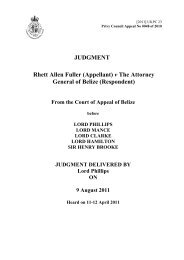
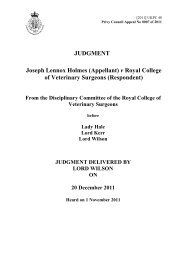
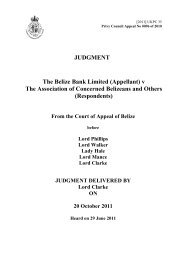
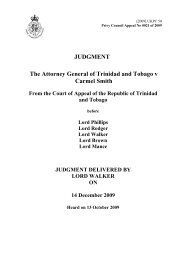
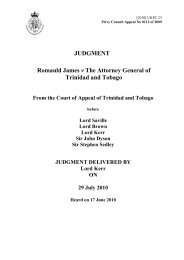
![[2011] UKPC 10 - Judicial Committee of the Privy Council](https://img.yumpu.com/23644185/1/184x260/2011-ukpc-10-judicial-committee-of-the-privy-council.jpg?quality=85)
